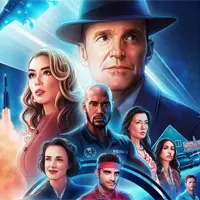Agents of S.H.I.E.L.D. has outlasted all other Marvel shows by constantly reinventing itself
-

The Marvel series kicked off its seventh and final season on Wednesday as a period drama set in 1930s New York City. "Over the course of six seasons, S.H.I.E.L.D. has evolved into a science-fiction fantasia, what one character describes as a 'fifth-dimensional freak show,' exploring human mutation, artificial intelligence, virtual reality, space exploration, time travel, and even magic (a.k.a. unexplained science, as agents Fitz and Simmons would say)," says Shakeema Edwards. "In its previous season, it became a full-blown space opera, equipped with aerial shots of spaceship fleets and the gaseous surfaces of distant planets, not to mention two alien species intent on invading Earth." Edwards adds: "What makes the evolution of S.H.I.E.L.D — created by Joss Whedon, Jed Whedon, and Maurissa Tancharoen — intriguing is not merely that it touches on numerous science-fiction tropes or that it has graduated from episodic to more serialized storytelling over the years. Nor is it the fact that it holds the distinction of being the first show to bring the shared universe of the MCU to the small screen and has subsequently outlasted other Marvel projects scattered across Netflix and Disney-owned ABC, Freeform, and Hulu. (It’s the last show produced by Marvel Television under Jeph Loeb, the studio having since folded under the Kevin Feige–headed Marvel Studios.) No, what’s most fascinating about S.H.I.E.L.D. as it enters its endgame is how it’s committed to the practice of essentially adopting a new subgenre every ten or so episodes, particularly later in its run, which breaks its 22-episode seasons into multi-episode arcs. So while much of season one is a spy procedural, the first half of season four is a ghost story. And around the time Dolores Abernathy began questioning the nature of her reality on Westworld, S.H.I.E.L.D. became a robot thriller, with A.I.D.A., a life-model decoy created to protect field agents, searching for a way to achieve her own humanity in the second half of season four. The series bounds from one subgenre to the next at such rapidity that there’s barely time to to wrap your mind around one concept before it’s on to the next, with characters openly decrying the pace at which the team faces new trials and tribulations. But this breakneck speed also means that there are few filler episodes, allowing the show to maintain its momentum within and between seasons."
ALSO:
- Agents of S.H.I.E.L.D. really wanted to take chances for its final season: “I want to say that because this was our last season and because there was an underlying nostalgia, we really went for it with stories,” says co-showrunner Jeffrey Bell of the final season. “I mean, we took chances. There’s a lot of fun things that we would’ve never attempted earlier in the show and I’m really curious to see how fans respond to some of those bolder choices.” Fellow co-showrunner Maurissa Tancharoen adds: "There are some bold choices, that’s for sure."
- Agents of S.H.I.E.L.D. has been quietly groundbreaking with three prominent female Asian-Americans -- co-creator and showrunner Maurissa Tancharoen and series stars Ming-Na Wen and Chloe Bennet. "What was special about it is how, just, normal it was," says Bennet. "We entered the show in a very different climate here in Hollywood and in the industry than we exited it. So there was a big shift in kind of the attention that our show got for casually having two Asian leads and an Asian showrunner. For a long time that wasn't talked about, because we were all just right for the job. That's why we got the parts, and that's why we were doing those jobs, because we were right for the role... We all just happen to be Asian. And so, what I love about it is how casual it was and how organic it was."
- Chloe Bennet on being able to time travel through the MCU in Season 7: “I never thought as a half-Asian, that I would ever get cast in any sort of period piece, because usually it’s white people," she says.
- Clark Gregg on Phil Coulson being brought back as a Life Model Decoy: "I was a little thrown at first," he says. "I internalize everything Coulson cares about whether I want to or not. He was really adamant that he didn’t want that. And even though I love (the Star Trek: The Next Generation character) Data, I didn’t want Phil Coulson to be Data, you know, the cyber being following them around doing fast math. Their idea around it was very different. He’s wrestling with some of the stuff that classic AI characters have dealt with in the past: What am I? What am I now, in his case. And he’s also not really the kind of typical LMD. There’s other, much more advanced stuff going on. I think someday when there is extremely advanced AI, it’ll be harder to really tell the difference between organic intelligence and that form of artificial intelligence. (Pause) I went full nerd on you, didn’t I?!"
- Gregg calls his Coulson role "one of those happy accidents for an actor"
- “The New Deal” final season premiere burns through a lot of plot in a short amount of time, but it never feels rushed
TOPICS: Marvel’s Agents of S.H.I.E.L.D., ABC, Chloe Bennet, Clark Gregg, Jeffrey Bell, Maurissa Tancharoen, Ming-Na Wen, Asian Americans and TV, Marvel
More Agents of S.H.I.E.L.D. on Primetimer:- Every Single Show in the Marvel Cinematic Universe, Ranked From Worst to Best
- Joss Whedon responds to Buffy and Angel misconduct allegations, explains why he "had" to engage in affairs on Buffy set
- Marvel’s Agents of S.H.I.E.L.D. excelled in its depiction of sisterhood, something that the MCU fails to accomplish
- Agents of S.H.I.E.L.D. nearly introduced Marvel villain M.O.D.O.K. at the end of Season 4
